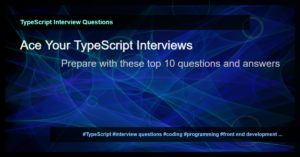Introduction:
Preparing for a MySQL interview can be overwhelming, especially if you don’t know where to start. This interview checklist is designed to help MySQL candidates gain confidence and better prepare for their interviews. It covers common MySQL interview questions, tips for answering them, and essential concepts that every candidate should understand. So, let’s dive in!
MySQL Interview Questions:
Here are some common MySQL interview questions that you may encounter during your interview:
- What is MySQL, and how does it differ from other database management systems?
- Explain the differences between MyISAM and InnoDB storage engines in MySQL.
- What are the advantages of using indexes in MySQL?
- What is the purpose of the GROUP BY clause in a MySQL query?
- How do you optimize a slow-performing MySQL query?
- Describe the ACID properties of a database and how MySQL ensures them.
- What is the difference between a primary key and a unique key in MySQL?
- Explain the difference between INNER JOIN and LEFT JOIN in MySQL.
- How do you import and export data in MySQL?
- Can you explain the concept of transaction isolation levels in MySQL?
- Accessing other network MySQL databases and multiple databases using phpMyAdmin
- Interview Checklist for MySQL Candidates
- SQL Create, Insert, Update, and Delete: Basic Database Operations
Tips for Answering MySQL Interview Questions:
To ace your MySQL interview, follow these tips for answering interview questions:
- Read and understand the question carefully before answering.
- Take your time to think before responding. It’s better to provide a well-thought-out answer than rushing into a wrong one.
- Use examples and real-life scenarios to support your answers.
- Be concise and to the point. Avoid rambling or going off-topic.
- Show your problem-solving skills by breaking down complex queries or scenarios into smaller, manageable parts.
- Demonstrate your knowledge of MySQL-specific functions, features, and best practices.
- Don’t hesitate to ask for clarification if you’re unsure about the question.
- 10 Agile Management Interview Questions and Answers
- 10 TypeScript Interview Questions and Answers
- Important AWS SDK S3 Bucket Interview Questions and Answers
- Interview Cheatsheet for PHP Developers
- Dart Interview Cheatsheet
- Python Interview Cheatsheet
- JavaScript Interview Cheatsheet
- Java Interview Cheatsheet
- Chakra UI Interview Questions and Answers
Important Concepts to Understand:
In addition to answering specific questions, it’s crucial to have a solid understanding of the following MySQL concepts:
- Database normalization: Explain the different normalization forms and their benefits.
- SQL queries: Understand the various types of SQL queries, including SELECT, INSERT, UPDATE, DELETE, and more.
- Joins: Master the different types of joins, such as INNER JOIN, LEFT JOIN, RIGHT JOIN, and FULL JOIN.
- Indexes: Know how to create and use indexes to improve query performance.
- Stored procedures: Familiarize yourself with creating and executing stored procedures in MySQL.
- Transactions: Understand the concept of transactions and how to ensure data consistency using transactions.
- Triggers: Learn how to create triggers to perform specific actions in response to database events.
- Views: Comprehend the purpose and benefits of creating views in MySQL.
Conclusion:
Preparing for a MySQL interview requires a combination of knowledge, practice, and confidence. By following this interview checklist and familiarizing yourself with common MySQL interview questions, tips for answering them, and essential concepts, you’ll be well equipped to tackle any MySQL interview with ease. Remember to practice coding and solving MySQL queries regularly to enhance your skills. Good luck!


